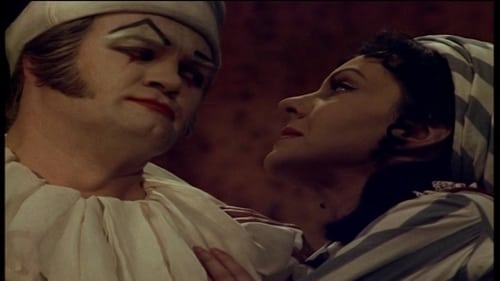Fiorenza Cossotto
出生 : 1935-04-22, Crescentino, Piedmont, Italy

Princess de Bouillon
Francesco Cilea's Adriana Lecouvreur concerns a doomed love based on a real story about an actress involved in a famous love triangle. Mirella Freni sings the title part in this production that was broadcast on television originally in 1989. Gianandrea Gavazzeni conducts the orchestra. Live from La Scala, 1989

Azucena
tt0253843. Il Trovatore (1985) Verona. Verdi / Italian.
Reynald Giovaninetti conducts the Orchestra of the Arena di Verona in a performance of Verdi's 'Il Trovatore'. The international cast includes Giorgio Zancanaro and Rosalind Plowright. The Count Di Luna believes that his younger brother was murdered years before by a vengeful gypsy, but still hopes that he may be alive. When he attempts to court the beautiful Leonora, he is enraged to discover that she has a lover - the troubadour, Manrico. Manrico and the Count duel, and afterwards Manrico reveals to Azucena, the woman he believes to be his mother, that when he had the opportunity to kill the Count he felt something holding him back.

Amneris
This was one of the most emotional evenings in Met history—the night Leontyne Price bid farewell to opera. Aida is the role that inspired audiences around the world to acclaim her as the greatest Verdi soprano of her time. And this telecast shows why: the famous soaring phrases that seemed to never end, the shimmering top to her lustrous voice, undimmed by the years. But most of all, there is the ennobling heart and soul Price lavished on every performance—captured here forever. With James Levine conducting the Met orchestra, chorus, and ballet.

Amneris
tt0262216. Aida (1981) Arena di Verona. Verdi / Italian. Verdi's most famous opera is performed at the Arena of Verona in Italy. Egypt and Ethiopia are at war. Radames is appointed commander of the Egyptian forces by the King, whose daughter, Amneris, loves Radames. It is in fact Amneris' Ethiopian slave Aida whom Radames loves. Ramades wins the war against the Ethiopians, capturing Aida's father Amonasro in the process. On his return to Egypt he faces a choice between marrying Amneris or betraying his country through his love for Aida. This production is conducted by Anton Guadagno and features performances by Maria Chiara, Fiorenza Cossotto and Nicola Martinucci.

Azucena
The gypsy Azucena (Fiorenza Cossotto) takes revenge for her mother who was accused of putting a curse on one of the old Count di Luna's two sons: she decides to abduct the younger child and throw it in the flames. But when she is about to carry out this fatal act, the gypsy sacrifices her own child and keeps the old Count’s son, whom she names Manrico (IL TROVATORE, Plácido Domingo). Later, as adults, the troubadour Manrico and the Count di Luna’s elder son (Piero Cappucilli) do not know each other, but become rivals for the beautiful Leonora (Raina Kabaivanska). Manrico succeeds in winning the young woman’s heart, and she sacrifices herself for him, deceiving the Count’s son. Mad with jealousy, the latter orders the execution of the troubadour in front of his mother. Azucena reveals to him that Manrico was his brother. This legendary performance of Giuseppe Verdi's most successful opera was recorded at the Vienna State Opera under the baton of Herbert von Karajan.

Santuzza
Plácido Domingo takes on the leading tenor roles in this 1976 live performance at the NHK Hall in Tokyo, Japan.

Santuzza
Opera's most popular double bill, fondly known as Cav and Pag, can be a tawdry mess or, as in this performance of Pagliacci, a searing experience. Its power derives from an all-star cast headed by tenor Jon Vickers in the double role of betrayed husband, Canio, and tragic clown, Pagliacci. Hes a singer who blurred the division between reality and stage illusion in every role he assumed, thus taking an opera about that thin line between real life and stage artifice to heightened levels of intensity. Vickers is a force of nature, his big, brawny voice suffused with emotion. Here, his phrasing, textual precision, and timbral colorations expand the scope of the opera, making a moving tragedy out of Leoncavallos verismo melodrama.

Self - Mezzo-soprano
Herbert von Karajan conducts La Scala Orchestra and Chorus with soloists Leontyne Price, Fiorenza Cossotto, Luciano Pavarotti, and Nicolai Ghiaurov.


Amneris
Here, we catch Cossotto within the period when she was delivering the meatiest and arguably most satisfying singing of her career. Her voice in 1973 remains a beautiful, distinctive, and responsive instrument, one ideal for conveying both sides of Aida's rival, outwardly fierce yet vulnerable and, ultimately, noble in spirit as well as birth. Carlo Bergonzi's Radamés signs of age-related decline on the great tenor's part are few. The voice is a little thicker and less freely produced than in previous years, and there is evidence here and there of a slight "tug" on some notes from the passagio upwards. The soprano Orianna Santunione, is a far less familiar and celebrated name seems to labor to meet demands of volume, and in the early scenes gives the impression of conserving. However, beginning with her first aria, she begins to pull it together, and somewhere along the way her diligence and responsibility transmute into something more, something quite affecting.








